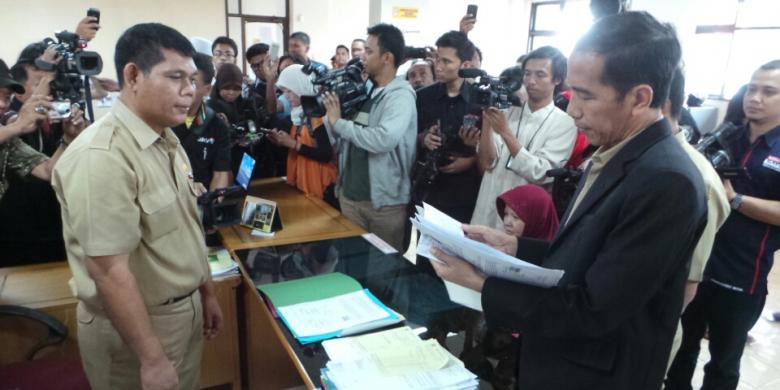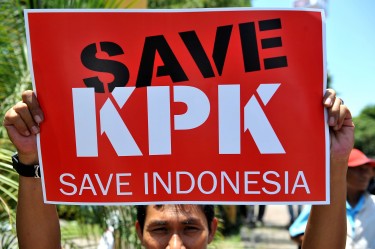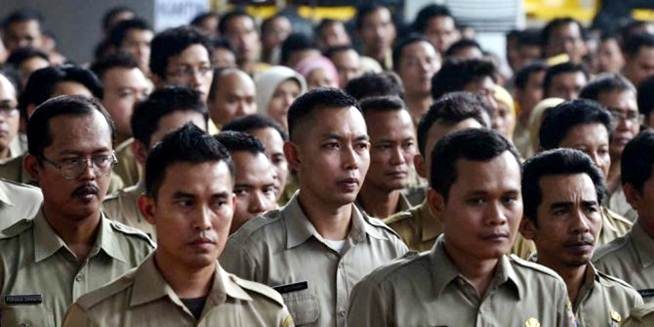
In 2010, Indonesia was scandalised when the Political and Economic Risk Consultancy (PERC) named its bureaucracy the second worst in Asia after India.
An unexpected aspect of Jokowi’s presentation in the first candidates’ debate was his emphasis on the fact that his party had moved away from offering the party leader as its presidential candidate to selecting the best person for the job.
It seemed rather un-Javanese of Jokowi to describe himself, implicitly, in these terms, and to risk incurring the wrath of PDI-P matriarch Megawati Soekarnoputri by doing so, given the obvious reluctance with which she had gone along with this strategy.
But the observation would not have been lost on members of the powerful Golkar party, now left ruing their egregious miscalculation in appointing the unelectable Aburizal Bakrie as their leader and putative presidential candidate. Especially if Jokowi is successful, this election may mark a significant turning point in the way Indonesia’s political parties go about their business.

Jokowi wants ‘the best man for the job’ and has opened up hiring for the Jakarta administration. Photo credit: nonstop-online.com
Boosting public sector performance
More important than this–but seemingly little noticed–was the extension of the same principle of selecting the best person for the job to Indonesia’s bureaucracy and, presumably, to the public sector as a whole.
According to Jokowi, rather than the present practice of appointing individuals to managerial and leadership positions on the basis of direct dealings or favouritism, such positions should be opened up to competition in which the best available applicants are selected.
Jokowi had in fact already moved some distance in this direction in his role as Governor of Jakarta, by allowing competitive applications for positions of borough and neighbourhood chiefs (camat and lurah) from anyone within the ranks of Jakarta’s civil servants.
The performance of public sector agencies can only be as good as the quality of its people–especially at managerial level–allows. In this respect the public sector is no different from a football team: top performance requires filling all positions with the best and most highly motivated talent.
A key difference, of course, is that there is no competitor for the public sector. A football team that fails to recruit well and develop its players will not win matches and will eventually fold or be relegated to a lower division. By contrast, poor performance of Indonesia’s public sector as a consequence of failure to appoint the best available people–and to motivate them to perform well–shows up simply as a failure of the economy to realise its potential.
The importance of reasonable salaries
Even with sound recruitment and promotion policies, the pool of talent offering itself to fill public sector positions will be of poor quality unless reasonable remuneration is also on offer. The law on the civil service requires exactly this, but it neglects to define what is “reasonable and fair”.
The only definition that makes sense is that remuneration should be closely related to salaries that are available within the private sector for given levels of educational achievement, working experience, level and scope of responsibility, and so on. In other words, for the public sector to be seen to provide an attractive career alternative to the private sector, individuals should be able to choose it without incurring any significant financial penalty.
As I have noted elsewhere, this is not the case in Indonesia, where there is little progressivity of salaries as individuals are promoted up the managerial ranks, such that high-level officials’ formal remuneration is only a small fraction of that of their peers in the private sector.

Public sector salaries are woefully small, making recruitment of the best and the brightest a huge challenge. Prabowo has stated he believes in the ‘quality of life’ of Indonesia’s bureaucrats. Image from Sorotnews.com
Prabowo’s presentation also drew attention to this issue by emphasising that the government of the day should ensure a decent “quality of life” for its employees. Although he did not spell this out precisely, presumably he meant that the quality of life of judges or prosecutors, for example, should be similar to that enjoyed by those of their peers who had chosen to work within the private sector.
Failure to provide salaries commensurate with this quality-of-life benchmark provides half of the explanation for Indonesia’s endemic corruption–not only in the ranks of officials responsible for law enforcement, but throughout the bureaucracy and the entire public sector.
The other half of the explanation is the present failure to ensure that all positions are filled by the best person for the job, which is not possible in the absence of reasonable remuneration and a willingness to allow unrestricted applications for all vacant positions. Although Jokowi did not talk about the possibility of allowing high-level positions to be filled by private sector applicants, it seems likely–given his own background as a successful private sector entrepreneur prior to moving into leadership roles in the public sector–that he, at least, would not be averse to such an idea.
Anti-Corruption Commission is not the solution to beating corruption

Err..no actually, the KPK alone cannot save Indonesia from corruption. Photo credit: globalvoicesonline.org
Both candidates praised the work of the anti-corruption commission, the KPK, and implied that they would give it their full support should they be elected. But although the commission has succeeded in securing the conviction and imprisonment of many high-ranking corrupt officials, its success at the micro level serves only to highlight its failure in macro terms.
Corruption remains endemic, and such a large proportion of public sector officials are so dependent on it to maintain their lifestyles that there is no prospect whatsoever that it can be brought under control relying on this approach. The threat posed by KPK to corrupt officials, including parliamentarians, has already triggered various attempts to emasculate it, and these can only be expected to continue. Moreover, without wanting to appear flippant, there are simply not enough prisons in Indonesia to accommodate all those who engage in corruption.
One of the great disappointments of the decade-long presidency of Susilo Bambang Yudhoyono has been the failure to realise that the detection-and-punishment approach makes no attempt to deal with the cause of the problem, which the presidential candidates’ debate has correctly identified as grossly inadequate salaries for higher-level officials and an unwillingness to promote genuine competition for high-level positions in the public sector. In this sense, the first candidates’ debate has opened for discussion a topic that holds perhaps the most important key to Indonesia’s future.
……………
Ross H. McLeod is an Adjunct Associate Professor for the ANU’s Indonesia Project.
 Facebook
Facebook  Twitter
Twitter  Soundcloud
Soundcloud  Youtube
Youtube  Rss
Rss 